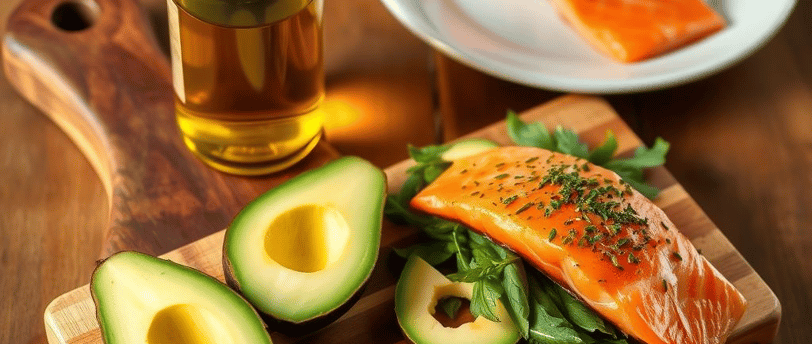Eat Heart-Healthy Fats: Boosting Good Cholesterol with Avocados, Olive Oil, Nuts, and Fatty Fish
🧘WELLNESS TIPSHEART HEALTH & CIRCULATION❤️


Low-fat diets and cholesterol phobia dominate the conversation around heart health, it may come as a surprise that the right types of fats can actually be beneficial for your cardiovascular system. Scientific evidence supports the idea that incorporating heart-healthy fats like avocados, olive oil, nuts, and fatty fish into your diet can help increase levels of good cholesterol (HDL) while reducing bad cholesterol (LDL). This article explores the profound effects of these nutritional powerhouses on heart health and provides suggestions for integrating them into your daily meals.
Understanding Cholesterol: The Good and the Bad
Cholesterol is a waxy substance found in every cell of your body. While it plays crucial roles in producing hormones, vitamin D, and substances that help digest foods, not all cholesterol is created equal. LDL, often referred to as "bad" cholesterol, can lead to plaque buildup in the arteries, increasing the risk of heart disease and stroke. On the other hand, HDL, the "good" cholesterol, helps remove LDL from the bloodstream. This balance is critical for maintaining overall cardiovascular health.
The Role of Fat in Your Diet
Fats are an essential macronutrient that provides energy, aids in nutrient absorption, and protects organs. However, the type of fat consumed can make a significant difference in health outcomes. While saturated and trans fats are typically harmful, certain unsaturated fats can be da beneficial component of a heart-healthy diet. Here’s a deeper look at four key food groups rich in these beneficial fats:
1. Avocados
Avocados are often celebrated for their creamy texture and unique flavor, but they are also nutritional powerhouses. Rich in monounsaturated fats, avocados can help elevate HDL cholesterol levels while reducing LDL cholesterol.
Moreover, a study published in the Journal of the American Heart Association found that including one avocado a day in a moderate-fat diet led to significantly lowered LDL cholesterol levels in overweight and obese individuals. Avocados are packed with fiber, potassium, and antioxidants, making them a stellar addition to any meal. Try adding sliced avocado to salads, blending it into smoothies, or spreading it on whole-grain toast.
2. Olive Oil
Extra virgin olive oil is a staple of the Mediterranean diet, which is renowned for its heart-healthy benefits. It is rich in monounsaturated fats and contains antioxidants, specifically phenolic compounds, that have anti-inflammatory properties.
Scientific evidence shows that replacing saturated fats in the diet with olive oil is associated with a lower risk of cardiovascular diseases. A study published in Circulation found that a Mediterranean diet high in olive oil led to a 30% decrease in the risk of heart attack and stroke. Drizzling olive oil over salads, using it for cooking, or adding it to marinades can be a delicious way to incorporate this liquid gold into your diet.
3. Nuts
Nuts are small but mighty, providing a variety of nutrients alongside healthy fats. Almonds, walnuts, pistachios, and other nuts have been shown to improve blood lipid profiles, largely due to their high content of monounsaturated and polyunsaturated fats, along with fiber and protein.
The New England Journal of Medicine published a study indicating that individuals who consumed nuts regularly had a lower risk of developing heart disease. Just a handful of nuts a day can significantly influence heart health. Add them to yogurt, salads, or oatmeal, or enjoy them as a snack on their own.
4. Fatty Fish
Fatty fish like salmon, mackerel, sardines, and trout are rich in omega-3 fatty acids, which are essential for heart health. Omega-3s are known to reduce inflammation, lower triglycerides, and improve arterial function—all critical for maintaining a healthy cardiovascular system.
Numerous studies have illustrated the heart-protective benefits of omega-3 fatty acids. The American Heart Association recommends including at least two servings of fatty fish per week, as studies have demonstrated that such consumption is linked to a significant reduction in the risk of heart disease. To enjoy the benefits of fatty fish, consider baking, grilling, or incorporating it into salads and pasta dishes.
Tips for Inclusion in Your Diet
Now that we’ve explored the vast benefits of heart-healthy fats, how can you effectively incorporate these foods into your daily routine? Here are some practical tips:
Start Your Day Right: Add sliced bananas and a spoonful of almond butter to your morning oatmeal or smoothie to introduce healthy fats early in the day.
Snack Smart: Instead of reaching for processed snacks, consider a handful of mixed nuts or a small bowl of guacamole with veggie sticks.
Dress to Impress: Use olive oil as the base for homemade salad dressings, mixing it with herbs, vinegar, or lemon juice for extra flavor.
Fish Night: Designate one or two nights a week as “fish nights.” Experiment with various recipes that feature fatty fish and combine it with vegetables and whole grains.
Experiment with Avocados: Beyond guacamole, try avocado in smoothies, as a base for salad dressings, or even as a substitute for butter in baked goods.
Conclusion: Embrace Heart-Healthy Fats
In conclusion, the scientific evidence overwhelmingly supports the inclusion of heart-healthy fats in your diet to boost good cholesterol and promote better heart health. By embracing foods like avocados, olive oil, nuts, and fatty fish, you can significantly contribute to a balanced diet that enhances well-being.
By shifting the focus from eliminating fat to choosing the right types of fat, you can create a more enjoyable and sustainable approach to eating. Don’t be afraid to experiment with new recipes and flavors as you embark on your journey toward heart health. Empower yourself with the knowledge that being heart-smart can also be incredibly delicious!
